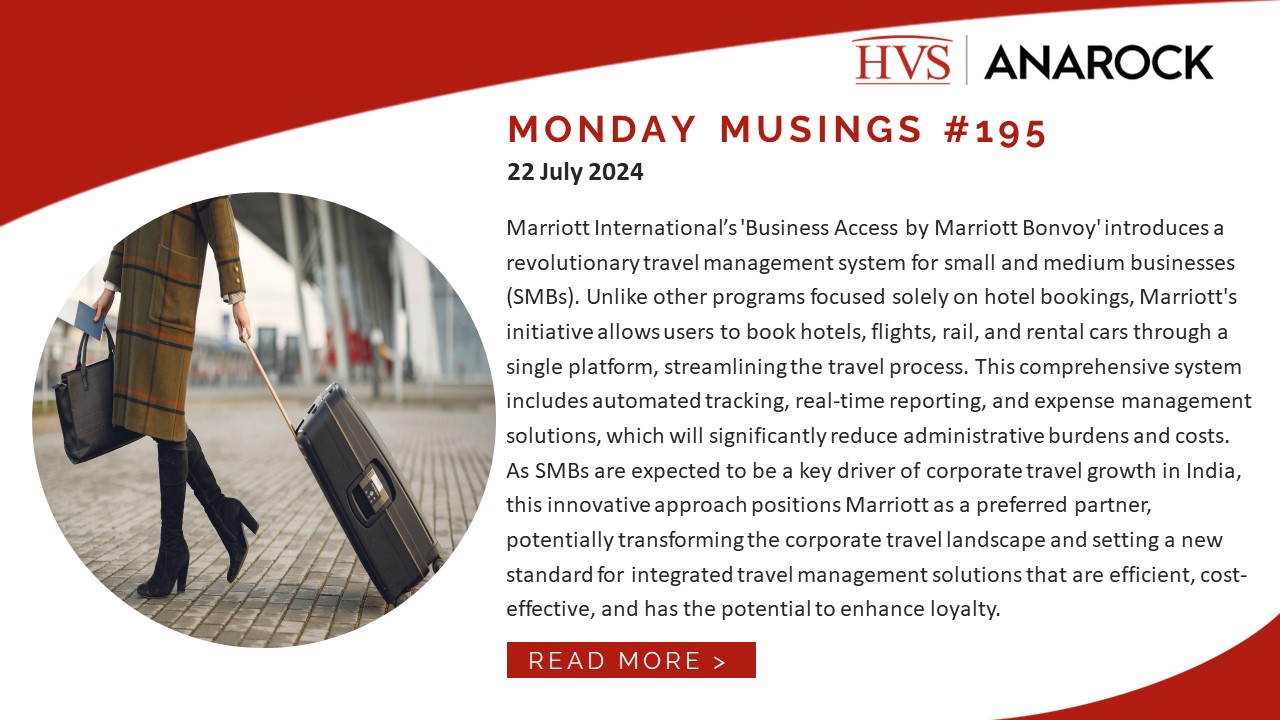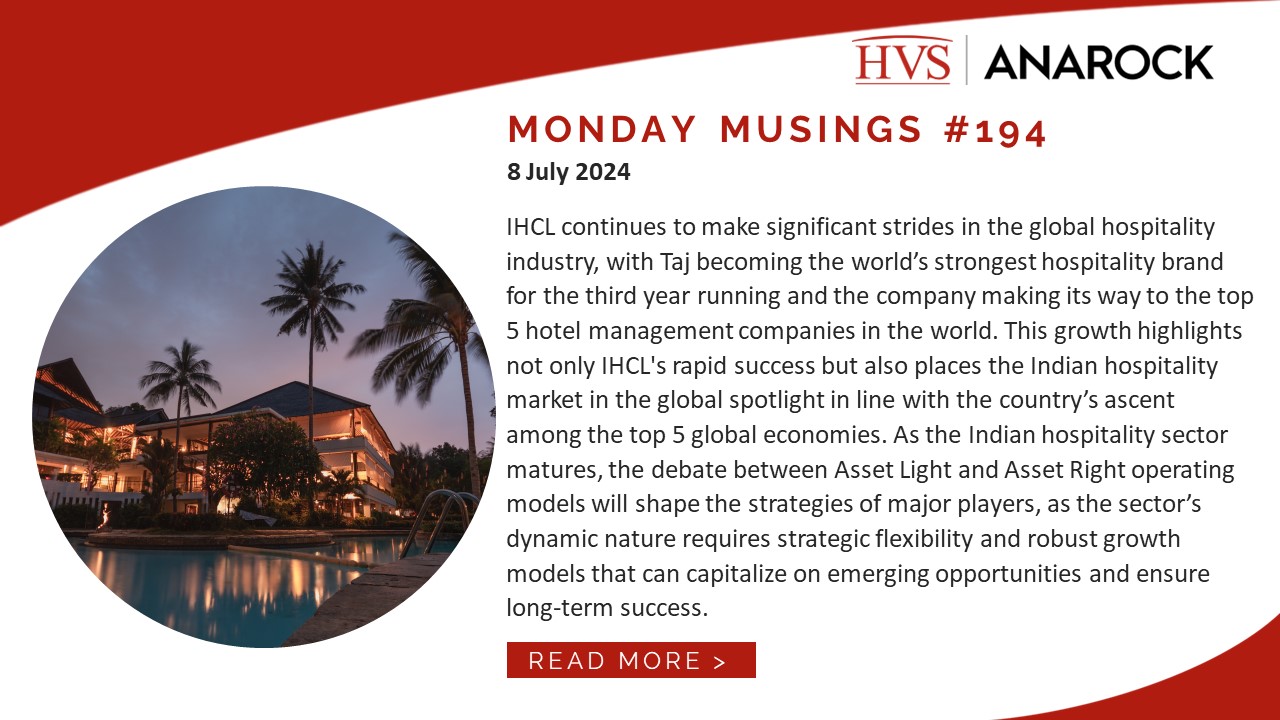'hopeful' is an annual publication launched at the HVS ANAROCK HOPE 2025 conference in February 2025. Featuring a range of articles and insights, the magazine offers valuable perspectives to guide through the changing hospitality landscape. Dive in to discover more.
Industry Insights
We have written thousands of articles about all aspects of hospitality, including valuations, investing, lending, operations, asset management, and much more.
hopeful - an HVS ANAROCK HOPE 2025 special edition
'hopeful' is an annual publication launched at the HVS ANAROCK HOPE 2025 conference in February 2025. Featuring a range of articles and insights, the magazine offers valuable perspectives to guide through the changing hospitality landscape. Dive in to discover more.
Halifax Hotel Market Revitalization
The Nova Scotia lodging market, particularly in Halifax, has experienced rapid growth in the years following the pandemic. In 2024, provincial RevPAR levels are projected to reach 128% of their 2019 benchmark, driven by rising ADR and an enhanced hotel supply.
HVS Takeaways – The Lodging Conference
This week marked another successful and highly attended Lodging Conference. HVS was proud to sponsor and speak at the event, and our recap is presented in this article.
Canadian Lodging Outlook Quarterly 2024-Q2
Canadian Hotel demand continues to outperform 2019 levels in terms of overall occupancy and is even neck and neck with 2018 which was Canada’s occupancy peak. ADR’s robust growth above inflationary rates at 4.3% YTD leads healthy RevPAR growth of 4.0% YTD June. In spite of inflation, deflated RevPARs are higher than pre-COVID levels. We have faced many headwinds with consumer disposable income constraints and geopolitical uncertainty; however, hotel performance continues to roar forward!
Another Successful Hotel Real Estate Society Event in Washington, D.C.–August 2024
The Hotel Real Estate Society (HRES) in Washington, D.C., met this week to network and tour a local luxury hotel. This article provides a quick overview of the organization, which was co-founded by Chelsey Leffet, and some information on this latest event.
HVS Monday Musings: Revolutionizing Business Travel – Marriott's Game-changing Initiative
Marriott’s new comprehensive travel management system for small and medium businesses has the potential to transform corporate travel management. Read on to know more.
The Serviced Apartment Sector in Europe 2024
Our Serviced Apartment Sentiment Survey invited lenders, investors and operators to share their views on the challenges and strategic focus points in 2024 and beyond.
HVS Monday Musings: Hotel Sector’s Big Debate - Asset Light or Asset Right?
As the Indian hospitality sector evolves, the ongoing debate between Asset Light and Asset Right models is intensifying. Read on to know more.
HVS ANAROCK Hotels & Hospitality Overview, June 2024
This is a monthly industry update that highlights the key trends in the Indian hospitality industry.
Brand Dilemma: Navigating the Pros and Cons of Launching New Brands – An Unbiased Perspective
Hala Matar Choufany contributes her insights on the “Brand Dilemma: Navigating the Pros and Cons of Launching New Brands – An Unbiased Perspective".
Industry Insights
We have written thousands of articles about all aspects of hospitality, including valuations, investing, lending, operations, asset management, and much more.
The Nova Scotia lodging market, particularly in Halifax, has experienced rapid growth in the years following the pandemic. In 2024, provincial RevPAR levels are projected to reach 128% of their 2019 benchmark, driven by rising ADR and an enhanced hotel supply.
This week marked another successful and highly attended Lodging Conference. HVS was proud to sponsor and speak at the event, and our recap is presented in this article.
Canadian Hotel demand continues to outperform 2019 levels in terms of overall occupancy and is even neck and neck with 2018 which was Canada’s occupancy peak. ADR’s robust growth above inflationary rates at 4.3% YTD leads healthy RevPAR growth of 4.0% YTD June. In spite of inflation, deflated RevPARs are higher than pre-COVID levels. We have faced many headwinds with consumer disposable income constraints and geopolitical uncertainty; however, hotel performance continues to roar forward!
The Hotel Real Estate Society (HRES) in Washington, D.C., met this week to network and tour a local luxury hotel. This article provides a quick overview of the organization, which was co-founded by Chelsey Leffet, and some information on this latest event.

Marriott’s new comprehensive travel management system for small and medium businesses has the potential to transform corporate travel management. Read on to know more.
Our Serviced Apartment Sentiment Survey invited lenders, investors and operators to share their views on the challenges and strategic focus points in 2024 and beyond.

As the Indian hospitality sector evolves, the ongoing debate between Asset Light and Asset Right models is intensifying. Read on to know more.
This is a monthly industry update that highlights the key trends in the Indian hospitality industry.
Hala Matar Choufany contributes her insights on the “Brand Dilemma: Navigating the Pros and Cons of Launching New Brands – An Unbiased Perspective".

Robust demand in urban centers continues to drive Canadian hotel values despite high interest rate environment.